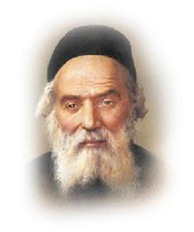This verse commands the Kohanim to be holy; it then commands the Kohanim not to desecrate Hashem’s name. Surely if the Kohanim are holy they would certainly not be desecrating Hashem’s name? If so, the second half of the verse is superfluous?
To understand this, Rav Moshe Shternbuch, basing his words on the Rambam answers that the greater a person is, the greater care he must take to ensure that his behavior reflects his elevated status. For if a person who is perceived as great performs an act which is seen in a negative light by people — even if it is not a sin at all — this constitutes a chillul Hashem, desecration of Hashem’s name.[1]
One Kohen who understood this concept was the Chofetz Chaim. At one point in his life he became very ill. Concerned about the Chofetz Chaim’s intense degree of concentration when learning Torah, the doctors warned him that if he continued to learn Torah before he felt better, the consequences would endanger his life.
In order to fulfill the requirement to look after ones’s health[2] the Chofetz Chaim acquiesced to the doctor’s advice and did not learn until he recovered. However, at the same time, he was concerned that if people would see him not learning it would cause a great chillul Hashem, because on his great level, a lot more would have been expected of him. Therefore, whenever he was in public, the Chofetz Chaim asked that a Gemora be placed open before him so that it would appear to all as if the he was learning from it.[3]
Whatever level we are on, we know the things that do not befit our status on a personal level and as the holy nation. Whether it is aggression behind the wheel, lack of impatience in a store, or something as simple as not saying thank you, we must know that our every action says a great deal to others about whom we are, and if our actions fall below our perceived level — even if no sin is committed — this could constitute a chillul Hashem, the exact opposite of what our purpose in is this world.

Rabbi Moshe Kormornick, is the best selling author of SHORT VORT, available in Jewish bookstores worldwide, as well as at Feldheim.com and on amazon.
The book contains over 340 pages of Short Vorts and stories on every Parashah, Yom Tov, and Simcha.
And it’s under $10!
Proudly published by Adir Press. To publish your book, click here










